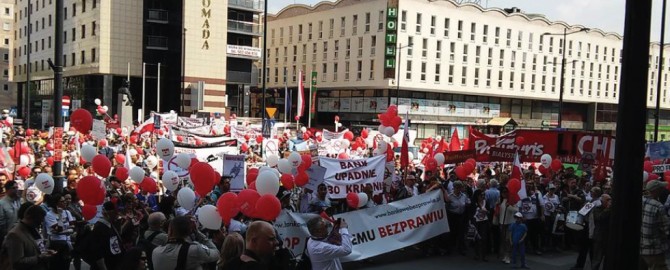-
President Duda is trying to find a way to make the Banks pay back for he considers that the dramatic present situatution “should not be Polish taxpayers’ problem”.
-
More than half a million Poles held a combined 144 billion zlotys ($38.3 billion) in Swiss franc debt as of the end of March of 2015.
More than half a million poles, specifically 550,000, took out home loans in Swiss Francs, mostly between 2007-2008. The reason this was the chosen exchange rate, is they believed they were going to benefit from low interest rates. More than 40% of all the mortgage lending that occurred those years in Poland, corresponded to this product.
When they acquired the mortgages, before the outbreak of the of 2008 crisis, “payback” due to the exchange rate was beneficial for the poles. The problem is the financial system is in constant fluctuation. Since then, the franc has risen more than 80% against the Zloty (polish national coin), therefor the exchange rate became very promptly adverse for the clients of these products, nearly impossible to service.
- This negative change in the exchange rate happened mainly due to two facts:The 2008 crisis for the global finances
- “The Swiss National Bank scrapped its cap on the franc´s exchange rate in January, allowing this coin to surge in value, and there for nearly scupper the rest.
President Andrezj Duda is not the banks best ally. As a matter of fact, Marek Belka (head of the national Bank of Poland) disagrees most of the time with the President’s policies, assuring that his need for justice will have “serious repercussions”; a most definitive weakening of the banking system and general economic consequences.
President Duda has always sustained, especially during his campaign election, that it is the “Banks that should bear the responsibility for solving the issue of Swiss franc Mortgages because it is them who made huge profits from these products”. Even tough that Duda thinks they should take the complete blame, he also believes that the government must be firm but not destabilise the banking sector.
The Polish President always defended a very concrete solution to solve the national problem, and that many other European countries were facing, that Mark Belka chief of the central bank described as “a ticking bomb”. Dudas original idea was that the mortgages have to be converted into the national coin (zlotys) at the rate that was in force at the exact time the loan was being taken out.
Duda sustains very strongly the conviction that the people whom have these mortgages should not pay the consequences of them, for the lenders and largely failed to correctly inform the customers of the risks. “Bank customers do not need to be experts on bank law, do not need to be experts on the world of finance…”, leaving again no doubt that he strongly believes that the only mistaken one is the bank and therefor the one who must emend the present situation.
As stated by Reuters agency; The Polish parliament´s lower chamber amended the ruling Civic Platrform (PO) party´s draft bill on foreign currency mortgage conversion into zlotys, increasing the number of lenders eligible for conversion and the cost for banks. The bill still need to be approved bu the upper chamber, and signed by Duda to become law, that is still even today a draft law.
Written, drafted, signed or however this law is right now, it is important to that it manages to establish, according to Duda and it´s political party PIS) justice for the customers of these mortgages by:
- Fair Exchange rate. This will be set individually, creating an equality zloty loans and those taken out in foreign currency.
- Borrowers will also be allowed to hand over their property to cancel the mortgage without additional costs.
- Banks must return to borrowers the amount they charged customers in the past to convert zloty that exceeded the central bank´s average rate.
- Manage all this but never destabilise the banks nor create any problems or fluctuations in the financial market nor in the economy, and coordinate with them from the government.


